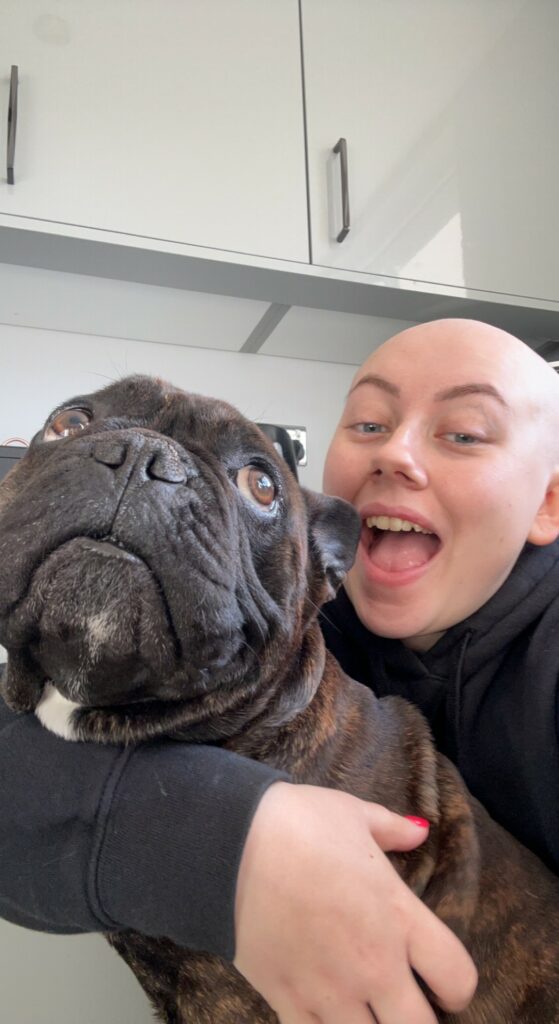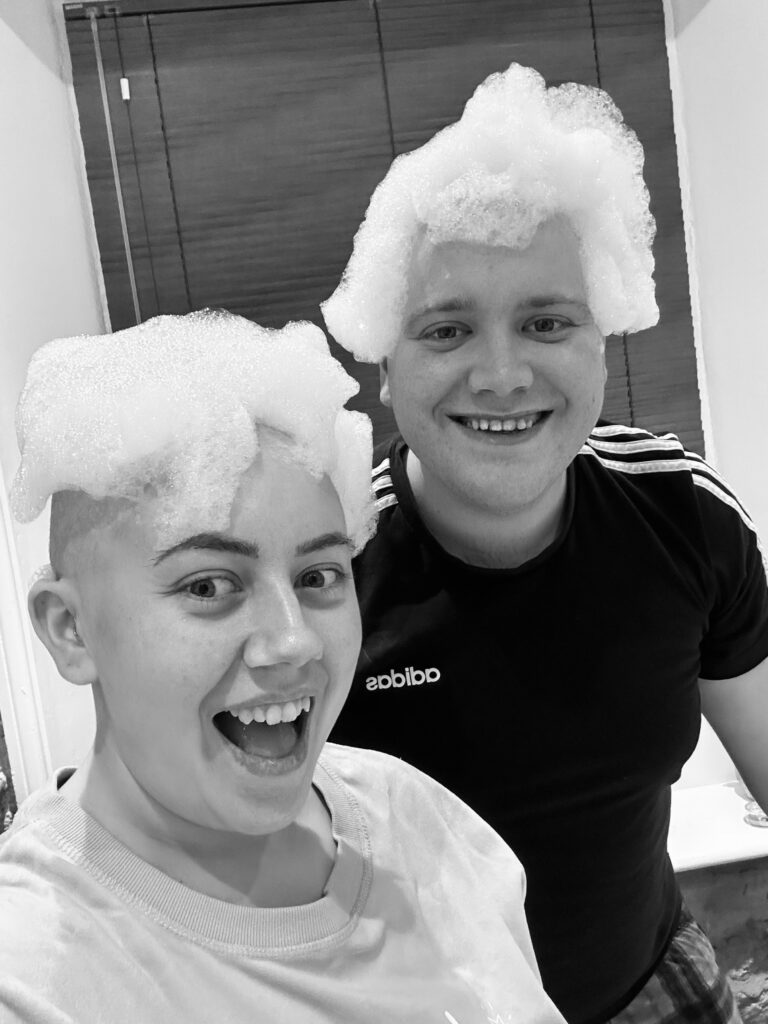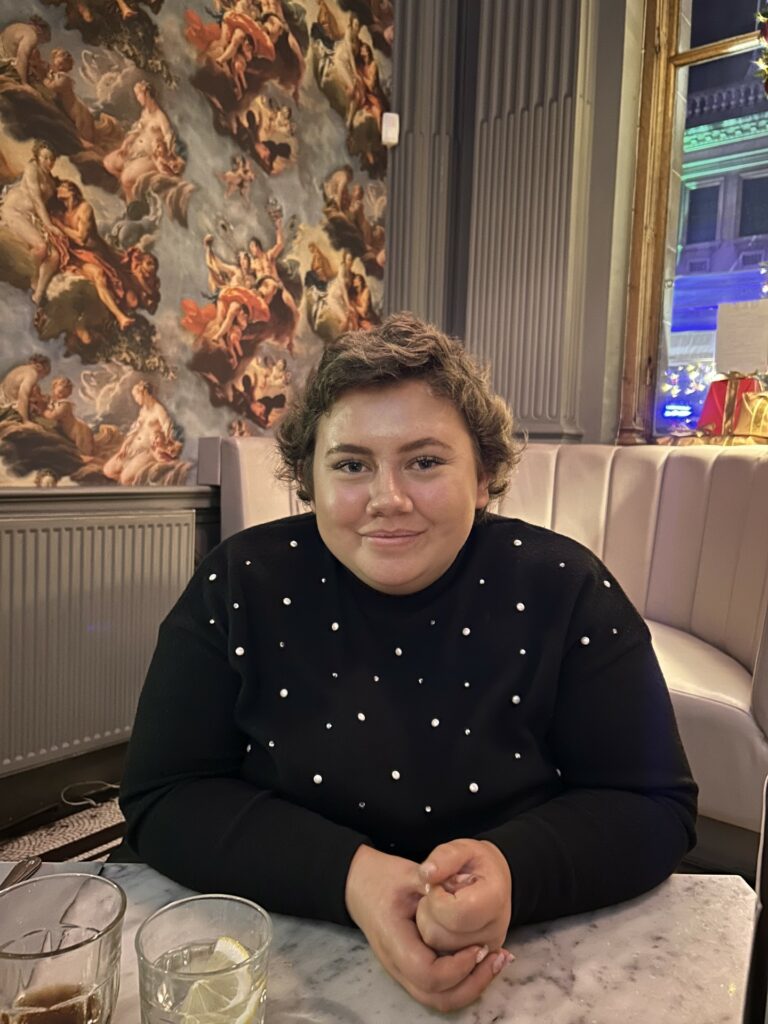A woman from Durham who was diagnosed with ovarian cancer aged 23 – after scans showed she had a 30-centimetre cyst – is encouraging people to be aware of the symptoms of the disease.
Emma College was diagnosed with stage 3 ovarian cancer in September 2022 and wants to raise awareness that it’s not just older people who can get ovarian cancer.
Emma, who was supported by Teenage Cancer Trust, started experiencing bloating in February 2022 but she thought it could be IBS or food allergies.
“I started a new job in a prison in the March and we were doing restraint training. I was laying on the floor and I thought I could feel ball in my stomach. It felt like I was laying on a watermelon.
The 24-year-old said
“I then started going to the toilet more. I was thinking that maybe it’s not IBS but something else, like eating lots of salty food.
“I know people say don’t Google it but when I Googled my symptoms it always said that ovarian cancer is found in people mostly aged 50 and over.
“Even though I had the symptoms, I thought it was IBS – even the doctors were telling me it could be that.”
It can be hard to recognise the early signs of ovarian cancer because the symptoms are vague and can be mistaken for other things such as period symptoms or food intolerances.
“I’m determined to make sure that every young person knows about the signs and symptoms of cancer.
Emma
“I want to let people know that it’s not just old people who get ovarian cancer.
“If you’re worried about anything, it’s really important to get it checked out, you won’t be wasting anyone’s time and if your symptoms persist, don’t give up, keep going back to the doctors for help.”
Before Emma was diagnosed, she said she looked so bloated that she looked pregnant. Despite doing pregnancy tests, they came back negative.
“I went to the doctors in the May and they told me I was pregnant. I knew I wasn’t and the test confirmed that.
Emma
“It got to the point where I’d eat two mouthfuls of food and I was full, nearly being sick.
“In the August, I went to a walk-in centre, and I was given anti-sickness medicine. Staff told me that they’d speak to my doctor because I needed to be seen.”
Emma had a doctor’s appointment in the September and was referred to the Queen Elizabeth Hospital at Gateshead Health NHS Foundation Trust.
While she was waiting for her appointment she went to A&E because she was in pain.
She had an ultrasound that showed she had a 30-centimetre cyst in her stomach.
“At first, they thought it was just a cyst but then the doctors asked my mam to come in because there had been some complications on the scan,” Emma said.
“When the doctors did the CT scan, they saw all of the cancer.
“It had spread to my stomach and the stomach lining. The cyst was so big that they couldn’t see anything else because it had started crushing my kidneys.
“I thought I was too young to get ovarian cancer. It’s not common. But it was.
“The doctors sat me in a room, and my first question was: ‘Am I going to die?’ and they told me I wasn’t
“My mam started crying. I was crying too but then I was reassuring her.
“When I was first diagnosed, I was questioning whether I’d make it to my 24th birthday, or if I’d die tomorrow because at that time, I didn’t know what stage my cancer was at.
“But I am very strong willed. I’m stubborn and I told myself that this isn’t my time to go, and I’m making sure of that.”
Emma had a five-and-a-half-hour operation to remove the cyst and the ovary that was attached to it.
She had a second operation that took nine and a half hours. During the surgery she had a full hysterectomy, her appendix and spleen removed, some of her bowel removed and laser treatment. Emma also had a temporary stoma.
“Seeing the scars and the staples from my surgery really affected me at first but now I don’t care. It shows what I’ve gone through.
“A few days after my surgery I surprised the doctors by being up and walking around- I was determined to get my life back.”
Two months after her operation, Emma had six rounds of chemotherapy at the Teenage Cancer Trust unit at the Freeman Hospital. She was supported by Teenage Cancer Trust Youth Support Coordinator, Gemma Rutherford, and Clinical Nurse Specialist, Danielle Wotherspoon.



Teenage Cancer Trust is the only UK charity offering specialised, age-appropriate care for 13-24-year-olds with cancer. The charity makes sure that young people have someone in their corner from diagnosis, and treatment and for up to two years afterwards so they can recover.
“I didn’t want to have chemotherapy at the Queen Elizabeth Hospital in Gateshead on a normal adult ward, because I thought it would be full of old people, and I didn’t want that, being so young.
Emma
“Having the support from Teenage Cancer Trust has made a huge difference and they are amazing. When I was told I was having chemo, I just imagined it being like you see on the TV – all the old people sat there in peace and quiet.
“I’m quite a loud person so when I went to the Teenage Cancer Trust unit, I met loads of friends who are my age, who I still speak to now.
“I got really dry skin when I went through the menopause and Danielle organised for me to get some cream for my skin when I had my next chemo appointment. It’s the little things that make the biggest difference.”
“If I’d not had support from Teenage Cancer Trust, I think my experience would have been very different.”
Emma had her last chemotherapy treatment in April 2023 and scans showed that there was no evidence of cancer. She said that going through cancer has made her stronger and more determined.
Emma is now back at work and enjoying the things she loves such as going for walks, riding her bike and spending time with her family and friends.
Ovarian cancer signs and symptoms. *Source: Teenage Cancer Trust
Ovarian cancer is getting more common in young people,
It’s harder to diagnose than some other cancers, as the symptoms can be a bit vague,
Symptoms can include pain and bloating, as well as feeling full quickly,
Ovarian cancer is usually diagnosed with a blood test and/or scan,
It can be treated with surgery, chemotherapy or both,
Some signs and symptoms of ovarian cancer can be:
Pain around your pelvis and tummy that isn’t linked to your period,
Feeling bloated a lot, but at times when you haven’t got your period,
Struggling to eat because you feel full quickly.
If you have these symptoms, it’s worth getting checked out with a doctor.



















